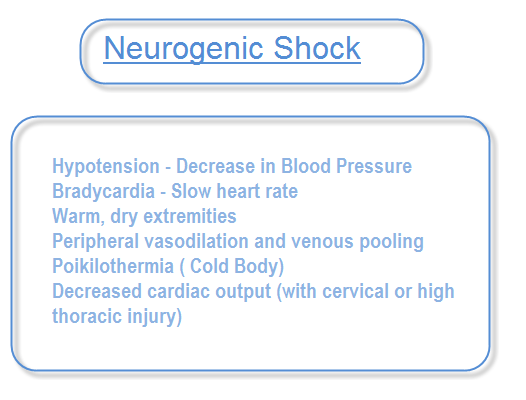
Neurogenic Shock Bradycardia. Neurogenic bradycardia is a symptomatic pathology that develops against extracardiac diseases. Neurogenic shock is a type of distributive shock consisting of the hemodynamic triad of hypotension bradycardia and peripheral vasodilatation attributed to severe central nervous system damage head trauma cervical cord trauma or high thoracic cord injuries resulting in loss of sympathetic stimulation to the blood vessels and unopposed vagal activity. Management of neurogenic shock. If the main illness does not pose a threat to human health then you can not worry about the long term consequences.

The resting heart rate in bradycardia is below 60 beats minute and can even go lower when the patient is in neurogenic shock. No tachycardia is present because of the loss of sympathetic tone hypotension with a wide pulse pressure. Neurogenic shock is a life threatening condition caused by irregular blood circulation in the body. Unlike most forms of shock the state of neurogenic shock is unlikely to be corrected or improved with fluid resuscitation. Neurogenic bradycardia is a symptomatic pathology that develops against extracardiac diseases. Trauma or injury to the spine can cause this disruption.
The neurogenic shock is a common complication of spinal cord injury especially when localized at the cervical level.
Neurogenic shock is a type of distributive shock consisting of the hemodynamic triad of hypotension bradycardia and peripheral vasodilatation attributed to severe central nervous system damage head trauma cervical cord trauma or high thoracic cord injuries resulting in loss of sympathetic stimulation to the blood vessels and unopposed. Bradycardia in spinal cord injury is also found to be worsened by hypoxia or decreased blood supply. Neurogenic shock is a type of distributive shock consisting of the hemodynamic triad of hypotension bradycardia and peripheral vasodilatation attributed to severe central nervous system damage head trauma cervical cord trauma or high thoracic cord injuries resulting in loss of sympathetic stimulation to the blood vessels and unopposed vagal activity. Neurogenic shock is a type of distributive shock consisting of the hemodynamic triad of hypotension bradycardia and peripheral vasodilatation attributed to severe central nervous system damage head trauma cervical cord trauma or high thoracic cord injuries resulting in loss of sympathetic stimulation to the blood vessels and unopposed. Post traumatic neurogenic shock may result in irregular heart beat because of beat to beat variation of heart beat 2. The neurogenic shock is a common complication of spinal cord injury especially when localized at the cervical level.